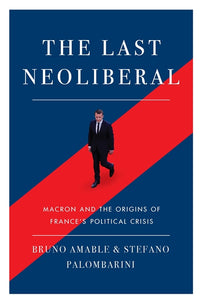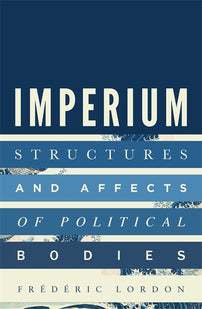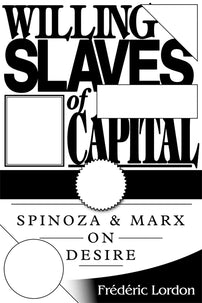A Shit Sandwich
Frédéric Lordon makes the case for voting for France's "New Popular Front" – formed by La France Insoumise, the Socialist Party, the Greens, the Communist Party and some smaller formations – in Saturday's snap first election round.

This article was originally published by Le Monde Diplomatique on 15 June 2024.
Whilst most of the left, including some of the far left, has accepted the need for unity behind the “New Popular Front” – formed by La France Insoumise, the Socialist Party, the Greens, the Communist Party and some smaller formations – in the forthcoming legislative elections in France, some far left groupuscules (the Nouveau Parti Anticapitaliste – Révolutionnaire, Révolution Permanente and Lutte Ouvrière) are denouncing this agreement and even standing their own candidates in certain places (generally safe left seats). The philosopher Frédéric Lordon, who is often associated with this radical wing, takes issue in this piece with this approach.
So, in a flash, the European election has passed from being ‘without importance’ to a ‘historic event’. We find ourselves in a conjuncture quite unlike the parodies of 2002, 2017 or 2022, when, in each case, the outcome confirmed the ridiculousness of the great dramatic performance that had been staged. With the Rassemblement National taking first place in 95 per cent of all communes, the unprecedented nature of the situation leaves not a shadow of doubt. This time, the exercise in realism promises to be brutal. Particularly for the far left, which loves nothing more than to take refuge in its fantasies; one-off revolt condemned to repression with no further consequence, and even more so an anti-electoralism ‘on principle’ – ultimately, a mirror image of the same election fetishism as the camp of ‘nothing-but-elections’. In the gap between a doctrinal line and its dogmatic ossifications, there is a loss of all contact with concrete situations – to which a Leninist inspiration normally has the virtue of paying close attention.
A failure of imagination
Except for the happy imbeciles who imagine an election exhausts everything there is to say about politics in a ‘democracy’, let alone anti-electoral dogmatists, voting should rather be viewed with a stone cold eye, as an instrument whose utility is measured each time in a particular situation, to gauge whether there is more advantage than not in making use of it. And then, without telling oneself fairy stories of salvation and peaceful tomorrows, making use of it in the particular case. And, today, it turns out that this is such a case.
Clearly, in order for the far left to convince itself of this, an exercise of imagination is needed – a quality that some of its currents sadly lack. Imagination is the ability to give oneself in anticipation a vivid representation of what is likely to happen, in other words, images of sufficient impressive force: as if this had already come about. Then the spectacle we have before our eyes – provided it is correct – is a powerful aid in determining an adequate line, instead of having to await the advent of catastrophe to lament over what ‘we could never have imagined’.
And so, what we have to imagine is the RN in power. That should not normally be too difficult, since Macronism has undertaken enough measures to give us a quite precise foretaste of an actual fascism. So much so that the imaginative exercise only has to move the cursor further along. While Macron has led us in this direction, there still remains a margin for the worse: political leaders outside the institutional field arrested without motive, organisations dissolved arbitrarily and without recourse, the impossibility of the least demonstration of support for anything without immediate repression, anti-union laws practically prohibiting any action on the part of workers. Don’t the cases of the trade unionists Jean-Paul Delescaut and Christian Porta – the former condemned to a prison sentence for being an “apologist for terrorism”, the latter sacked for having “harassed” his bosses - give a sufficient glimpse of what the generalisation of such laws would mean? And isn’t the case of the Hélène Boucher high-school students (who occupied their high school in solidarity with Palestine) eloquent enough – chased out of their classrooms by totally out-of-control cops, pistols at the ready, and told: ‘You’ll see what a real fascist regime is like’?
[book-strip index="1"]
And indeed, we will see. We will see fascist police, we will see authorisations to fire live rounds in the banlieues, against demonstrators or ‘eco-terrorists’. We will see ‘refusals to comply’ and the Chilean future of police-station basements. We will also see fascist justice: its penal policy, its special instructions, its appointments of prosecutors. Indeed, we will see an administration infested with racist officials, specially at the intermediate levels, far from those appointments decided by the council of ministers – after having seen what this leads to in the form of managerial infestation: principals, hospital directors, commissioners, court presidents, etc. Those unconscious folk who light-heartedly imagine it’ll just be like Meloni, not so dreadful after all, have no comprehension of the French state.
Yet the imaginative exercise would remain very partial if it stopped at the limits of the state in the strict sense. For a well-organised fascism is very mindful of activating its ancillaries, who are charged with doing everything that the state itself, kept to certain formal obligations of behaviour, cannot do: militias with a free rein, neo-Nazis in the streets, no longer surveilled – but perhaps informed – by the intelligence services, raids, left-wing militants identified and hunted, with the blessing of the police and the cooperation of ex-policemen – and that is perhaps the most frightening thing, the fusion of two militias, that of the state and that of the street. If you have the stomach for it, take another look at Salò or the 120 Days of Sodom to get a good idea of the essence of fascism: the unleashing of impulses and limitless political violence – not stopping at assassination.
Electoral utilitarianism and rational choice
It is necessary to keep all these images before our eyes, vividly present, in order to embark on a cold, utilitarian and strategic exercise and calculate what best to do with the impending vote. The only valid question is: knowing that from elections in bourgeois ‘democracy’ the choice is between nothing at all and nothing much positive to expect, will the coming election leave us in conditions able to continue our struggles or will it make our lives impossible? In what state will the workers’ movement find itself depending on a good or bad outcome – depending on whether we have let this turn out good or bad? Today’s Leninists have completely forgotten Lenin’s lesson, as he never in any way recommended disinterest in elections, sometimes even recommending participation, provided that the long-term strategic direction was never lost, i.e. the overthrow of capitalism, which there is no prospect of within the framework of the political institutions of capitalism, but which will necessarily involve quite other processes – revolutionary ones. But there is fat chance of ‘revolution’ if the ‘revolutionaries’ first let themselves be dissolved, or put in a cell, for having preferred to hold ostentatiously to their critique of electoral democracy, ignoring the requirements of a concrete – and decisive – situation.
[book-strip index="2"]
It is a rather simple argument that to participate in a vote where nothing more or less than the very conditions of any political activity of contestation is at stake, is not the same as falling into a fetishism of elections, with hopes that are inept and always disappointed – ‘parliamentary cretinism’. And dogmatic rigidities can be given a bit of dialectics, if, instead of refusing to look beyond a particular election we consider the possible articulations that may arise between the electoral situation and extra-electoral struggles. The point of reference here is certainly the Popular Front of 1936, yet most of the uses made of this today are flatly and wretchedly electoral, when the essential point is elsewhere: in the conditions created by an election to go beyond the election.
Swallowing
It is quite certain, then, that while waiting, we shall have to swallow a thick slice of shit, swallow the return of Olivier Faure of the Socialist Party, the joy of the Communist Fabien Roussel on Sunday evening of returning to his natural habitat, the ‘unitary’ uproar causing people to forget his nullity, attested once again by his mere 2 per cent, the Socialists crazy enough to endorse Aurélien Rousseau, who served in a Macronist government until recently, the rise of François Ruffin, whose strategies of self-promotion through media favour and the recycling of the left of the right would, in the normal course of things, have been condemned to defeat, but which find themselves well-served by the new situation, the pharisaism of Mediapart and the joyous cries of Libération, whose hatred for a now finally diluted La France Insoumise is no less than those of radio and TV stations; the excitement of No pasaran imitators who come out three times to demonstrate, but go back to sleep once the election is over. Yes, we are going to have to swallow all of this, precisely because this is what a rational choice dictates. Here is the brutal exercise in realism. And there is hardly any other choice than to submit to it. This is the sandwich.
Mathematicians have invented imaginary numbers to give solutions to equations that would not otherwise have them. But real politics does not have the leisure that mathematicians enjoy. They can dream of perfect solutions, but if these are imaginary, that is it. They are not real. Being taken hostage, on the other hand, is a real situation. And this is where we are. We may consider resisting this, hoping that in the end the pistol will fire water instead of a bullet, but the return to reality risks being painful. Besides, we are no longer quite so sure who is taking us hostage: the prisoner in the Élysée, Le Pen, the wretched left, which in fact does not want anything to change, along with its media, which do not want any change either; the true, ineradicable line of Mediapart is anti-anti-capitalism. But the fact is that we don’t have the leisure to be clever, or the choice of the Caudine yoke. Just the sandwich.
Nothing in all of this prohibits the exercise of discernment. For, whenever the electoral alternative presents itself in terms of X versus a fascist, the question arises of knowing whether there exists a significant difference between X and the fascist. If X is a fomenter of fascism, the alternative is no longer such; it is a dilemma. And, in a dilemma, it is legitimate not to choose but to look elsewhere and do something else. For example, in 2017 or 2022, X = Macron, = but Macron was a fomenter of fascism; therefore, do something else. Another example, X = the right-wing Socialists François Hollande, Bernard Cazeneuve, Manuel Valls, Carole Delga, Raphaël Glucksmann, other fomenters of fascism. Provided we understand that ‘fomenter’ here does not simply mean someone who is explicitly and positively the agent of fascist initiatives (Macron 2022, Hollande, Valls, Cazeneuve 2015), but also someone who carries out the policies of social destruction in which fascism thrives (Macron 2017, Hollande 2012, Glucksmann 20204). The whole question now, therefore, is to know where the centre of gravity of the left coalition will be found; which group will dominate it. If the response is on the side of the right-wing left, even the far-right wing, then the sandwich is not a rational choice but the very opposite: we won’t impose this on ourselves simply to continue once more with the same causes producing the same results.
And after?
But if the sandwich is necessary, and we do swallow it, history will not end with this disgusting morsel. For anyone capable of viewing a concrete election result strategically, outside the beatitudes of electoral fetishism, it is, on the contrary, the moment when history begins. The real history of the Popular Front did not begin on 3 May 1936, on the evening of the second round, but on 11 May with the first walkouts from the factories. What was voted, in fact was a remarkably soft programme. But no matter – it created a situation. The masses, assured that at least they would not be fired on by the police, took charge of matters for themselves, and this is indeed when everything changed – as they weren’t soft at all.
The antinomy between ‘elections’ and ‘the street’ is a strategic aberration. You can appeal to the street as much as you like, but the street is within a capitalist order, with capitalist institutions, including a capitalist police. A forcible challenge to the state is condemned to end up crushed, all the more so in the developmental conditions of surveillance capitalism. However, there is a weapon against which capital’s state can do nothing, and that is the stoppage of the economy. And there is one sole force capable of this exploit: the number and mass of workers.
[book-strip index="3"]
That is why, if the election is important in this situation, even vital, it remains nonetheless a minor event in relation to what is essential: to build up the numbers. To build them up outside of the institutions, away from all those mediators who have failed or are enmeshed in the logics of the overall institutional system – official parties, trade-union federations, etc. This is the development of a ‘Network for General Strike’, a network that, outside their trade-union labels, brings together those wage-earners determined to fight, and above all not to lose any more. This means replicas of the Chilean Popular Unity committees, which people joined leaving aside their particular memberships, perhaps initially to try and exert pressure from below on the pre-election manoeuvres of the apparatuses, but which will be far more necessary still after the election than before.
It is an understatement to say that, if the left combination does come to power, in conditions of financial, media and business adversity that are already present but set to intensify, the mobilisation of such numbers will be needed to save the New Popular Front from failure. Are such ‘networks’ and ‘committees’ already there embryonically? No matter if they are still only in a derisory state, we have to begin somewhere, if we want to try and do something different.
Translated by David Fernbach


